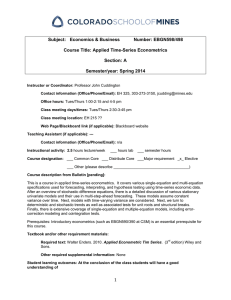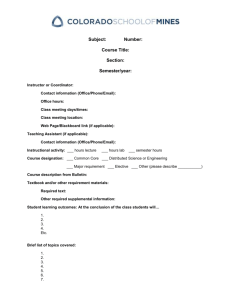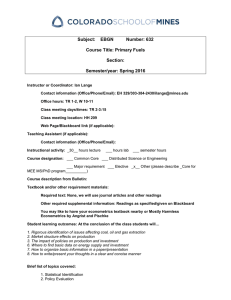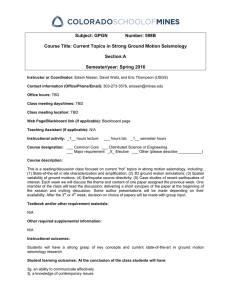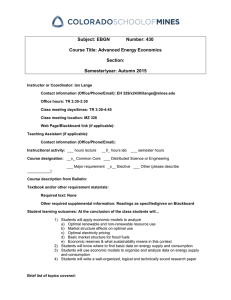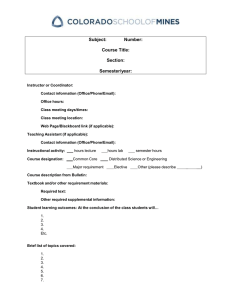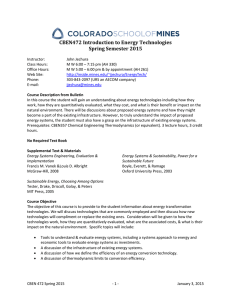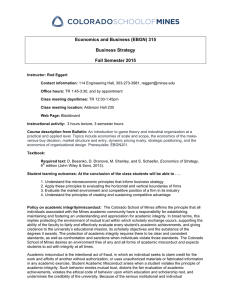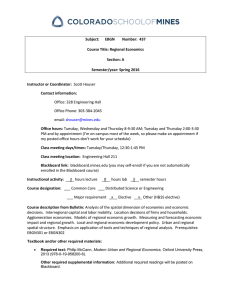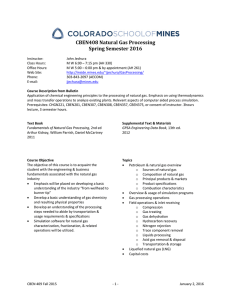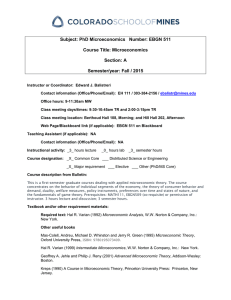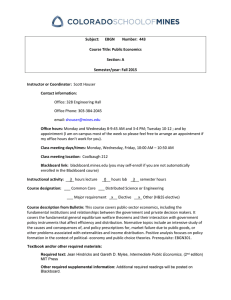Subject: Economics & Business ... Course Title: Energy and Environmental Policy Section: 1
advertisement
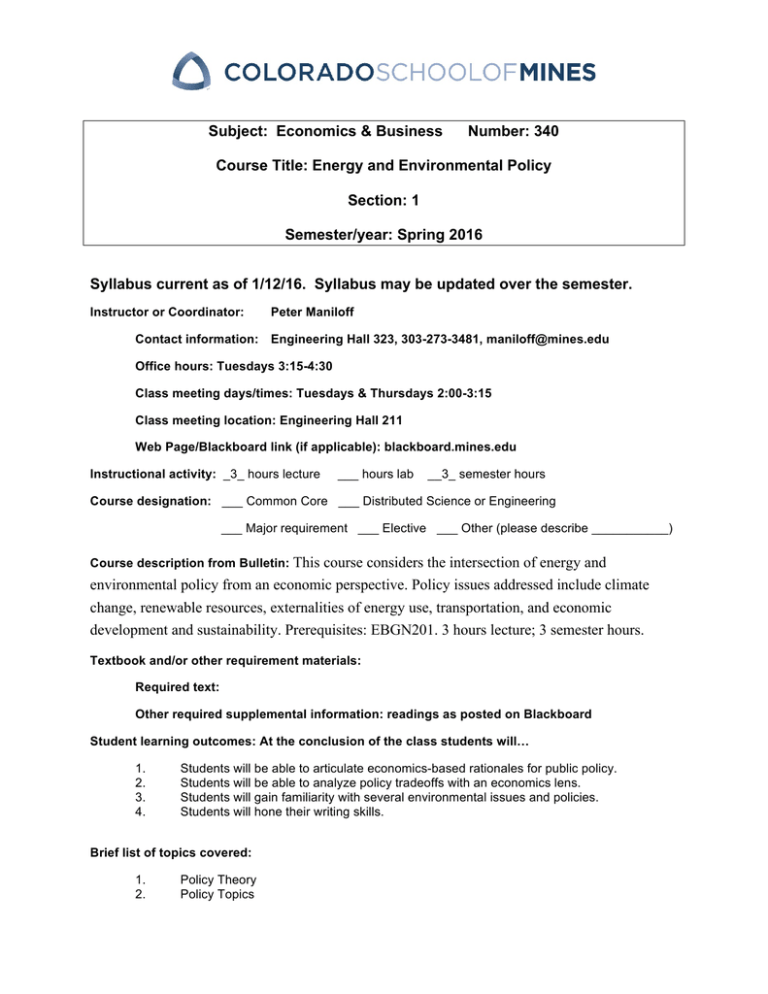
Subject: Economics & Business Number: 340 Course Title: Energy and Environmental Policy Section: 1 Semester/year: Spring 2016 Syllabus current as of 1/12/16. Syllabus may be updated over the semester. Instructor or Coordinator: Peter Maniloff Contact information: Engineering Hall 323, 303-273-3481, maniloff@mines.edu Office hours: Tuesdays 3:15-4:30 Class meeting days/times: Tuesdays & Thursdays 2:00-3:15 Class meeting location: Engineering Hall 211 Web Page/Blackboard link (if applicable): blackboard.mines.edu Instructional activity: _3_ hours lecture ___ hours lab __3_ semester hours Course designation: ___ Common Core ___ Distributed Science or Engineering ___ Major requirement ___ Elective ___ Other (please describe ___________) Course description from Bulletin: This course considers the intersection of energy and environmental policy from an economic perspective. Policy issues addressed include climate change, renewable resources, externalities of energy use, transportation, and economic development and sustainability. Prerequisites: EBGN201. 3 hours lecture; 3 semester hours. Textbook and/or other requirement materials: Required text: Other required supplemental information: readings as posted on Blackboard Student learning outcomes: At the conclusion of the class students will… 1. 2. 3. 4. Students will be able to articulate economics-based rationales for public policy. Students will be able to analyze policy tradeoffs with an economics lens. Students will gain familiarity with several environmental issues and policies. Students will hone their writing skills. Brief list of topics covered: 1. 2. Policy Theory Policy Topics Policy on academic integrity/misconduct: The Colorado School of Mines affirms the principle that all individuals associated with the Mines academic community have a responsibility for establishing, maintaining an fostering an understanding and appreciation for academic integrity. In broad terms, this implies protecting the environment of mutual trust within which scholarly exchange occurs, supporting the ability of the faculty to fairly and effectively evaluate every student’s academic achievements, and giving credence to the university’s educational mission, its scholarly objectives and the substance of the degrees it awards. The protection of academic integrity requires there to be clear and consistent standards, as well as confrontation and sanctions when individuals violate those standards. The Colorado School of Mines desires an environment free of any and all forms of academic misconduct and expects students to act with integrity at all times. Academic misconduct is the intentional act of fraud, in which an individual seeks to claim credit for the work and efforts of another without authorization, or uses unauthorized materials or fabricated information in any academic exercise. Student Academic Misconduct arises when a student violates the principle of academic integrity. Such behavior erodes mutual trust, distorts the fair evaluation of academic achievements, violates the ethical code of behavior upon which education and scholarship rest, and undermines the credibility of the university. Because of the serious institutional and individual ramifications, student misconduct arising from violations of academic integrity is not tolerated at Mines. If a student is found to have engaged in such misconduct sanctions such as change of a grade, loss of institutional privileges, or academic suspension or dismissal may be imposed. The complete policy is online. Grading Procedures: Class Participation 10% Topical News Item 10% Position outline 10% Position papers 40% Proposed Unit 15% Presentations 15% Assignments: Class participation – I will expect all students to be active and respectful participants in class. This includes sharing ideas and respecting the ideas of others. If you have questions, please see this website for a variety of ideas on how to productively participate: https://www.princeton.edu/mcgraw/library/forstudents/class-participation-contr/ In my classroom, I expect all participants to treat each other with respect to one another without regard to individual identity or presentation. Topical News Item – Each student will be responsible for starting one class with an environmental news item. You will concisely summarize the news, outline the policy question, outline the tradeoffs involved in the policy question, and give a preference based on the frameworks introduced in units I and II. Position outline – after unit III, students will complete an outline of the issue. Position papers – after units III-VI, students will write a 2 page paper advising a policymaker on the position she should take on a particular issue related to the topic. These papers may advocate any position, but the position must be justified by frameworks introduced in units I and II. Proposed Unit – students will propose another unit that could be covered. The unit should be topical in the spirit of units III-VI. Students should propose detailed topics to cover, including readings. This can be done in groups of 2-3. Presentations - Student groups will present their proposed units. This will include background information, as well as a particular policy question related to the issue and the group’s advice to a policymaker based on the policy question. I will distributed more detail about each assignment over the course of the semester. Coursework Return Policy: I will endeavor to return graded work within two weeks. Absence Policy (e.g., Sports/Activities Policy): I will follow standard Mines policy. Homework: • Homework must be turned in before it is due to be graded – plan ahead. Detailed Course Schedule: The units for the class are listed below. I expect to spend approximately 2 weeks on each unit, depending on the volume of the material and general class interest in the unit. I. Why do we have environmental policy? II. Introduction to public policy III. Conservation III. Water IV. Conservation V. Wildfire VI. Climate Change VII. Presentations
